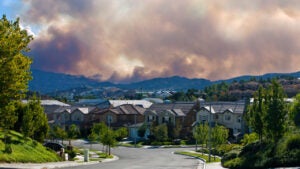Los Angeles wildfires: What happens to my mortgage after a natural disaster?

The L.A. wildfires have ravaged countless residential homes, leaving entire neighborhoods all but gone. If your home is damaged as a result of a natural disaster, you’re still responsible for paying your mortgage — even if the structure is uninhabitable or completely destroyed. Once you and your family are safely out of harm’s way, take these steps to set up payment relief.
Mortgage relief after natural disaster
Whether your home was completely lost or sustained damage in the Southern California wildfires, contact your mortgage servicer as soon as possible to learn about assistance or relief options. The servicer is the company you make your monthly payments to, and might or might not be the same as the lender you applied with to get the loan.
If you don’t know your servicer, try searching Fannie Mae’s lookup tool or Freddie Mac’s lookup tool. Alternatively, you can try calling Mortgage Electronic Registration Systems (MERS) at 888-679-6377 or visiting the MERS website. This method requires more detailed knowledge of your loan, however, which you might not have access to if loan documents were destroyed.
In natural disasters, servicers typically offer forbearance, a temporary pause in payments during which you won’t have to pay late fees or risk foreclosure, for up to 12 months.
You might learn that your servicer proactively extended you forbearance if your home was in an affected area. Generally, this automatic forbearance lasts three months.
No matter what, do not stop making payments without contacting your servicer. Without a forbearance agreement in place, your credit could suffer, you could be charged late fees and you risk foreclosure.
What happens when disaster forbearance ends?
What if you were buying or selling a home?
If you were in the process of buying or selling a home, review the purchase agreement for an “act of God” or force majeure clause. Depending on the contract, you might be able to get your earnest money refunded if you were the buyer, for example.
You might have already heard from your real estate agent, loan officer or settlement agent regarding closing delays or cancellations. If the property was damaged, it might need to be reappraised, or the sale might be off completely. Likewise, the closing date could be delayed if there’s a power outage, a hold on new homeowners insurance policies or office closures.
Be wary of scammers in these interactions — they often act in the wake of natural disaster. If you receive an email from your settlement agent, call the agent first to confirm the email is legitimate. Do not wire any funds without taking this step.
What to do if you lost mortgage documents
If you lost mortgage documents in a disaster and don’t have a digital record, contact your mortgage servicer to request copies. For documents like your house deed, you might need to reach out to your county assessor’s office or deed registry. For homeowners insurance policies, contact your insurance provider directly.
More resources for homeowners affected by natural disaster
- DisasterAssistance.gov
- Fannie Mae disaster resources
- FEMA app
- Bankrate: 6 steps to take after natural disaster
- Bankrate: Homeowners insurance resources for LA wildfire evacuees
Why we ask for feedback Your feedback helps us improve our content and services. It takes less than a minute to complete.
Your responses are anonymous and will only be used for improving our website.






